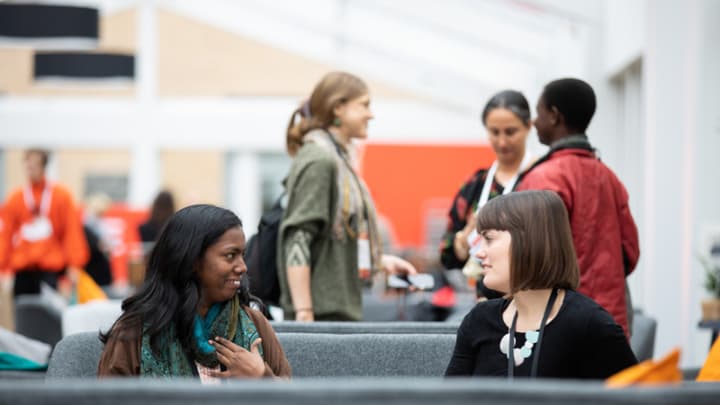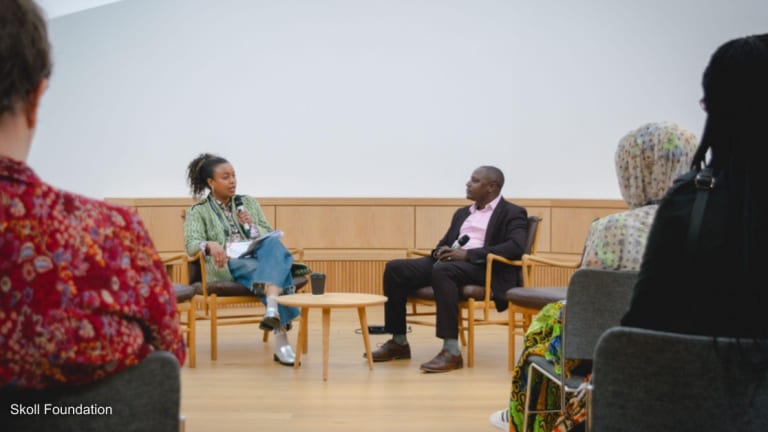
Social innovators who don’t fit a certain profile face a clear disparity in philanthropic investment.
The "right" networks to help secure funding are far from inclusive. The unwritten rules of the social entrepreneurship funding landscape form a labyrinth of invisible barriers to capital, every decision influenced by unconscious bias.
The problem is systemic. To break down those barriers, we in the funding community must engage in uncomfortable conversations. We need to take a critical look at ourselves. If we truly value a culture of philanthropy that is more diverse, equitable, and inclusive, there’s hard work to be done. Far too many good ideas are left unfunded because of bias in the systems that we’ve built.
If we look only at the philanthropic sector in the United States, total giving in 2014 was over $60 billion. According to the D5 Coalition’s most recent report, over 90 percent of foundation presidents are white and over 80 percent of foundation staff are white. Meanwhile, only 7 percent of funds go to programs that explicitly serve racial or ethnic minorities.
Echoing Green’s most recent data on its 2018 fellowship applicants revealed that for the first time ever, female applicants had raised more than their male counterparts ($104,000 average compared to $94,000 average). That data also revealed that in the U.S., black female applicants have raised only half that of white female applicants. This is the result of systemic implicit bias. Funders tend to fund people like themselves.
The Skoll Foundation is no different. Over the last several years the Skoll Foundation has conducted research to understand how we can cultivate a more diverse and inclusive pipeline. This has led to sometimes uncomfortable insights about how we source and select organizations.
Nomination-based processes are inherently biased — as you lean into who you know to recommend candidates, a familiar pool emerges. Acknowledging the flaws in our processes and networks, we’ve looked for ways to not only build a more robust pipeline but also examined the systems that keep the field from creating a more diverse ecosystem of social entrepreneurship.
We’ve made some positive progress: of six 2018 Skoll Awardees, five were women. Speakers at the 2018 Skoll World Forum were 60 percent female and 60 percent people of color. We are broadening our networks through partnerships with global and deep local reach, like the TEDx community. Along with expanded networks and improved processes, we are building a culture that constantly and respectfully addresses bias. In that effort, we’ve now seen three critical factors to identify — and curb — implicit biases in philanthropy.
More data to understand and address diversity, equitability, and inclusivity at a systemic level
Many foundations don’t collect data that would provide insight into their grantees’ diversity, equitability, and inclusivity performance. To improve this performance, we’ll have to start asking. A recent report from PEAK Grantmaking shows that only half of philanthropies collect demographic data on the leaders of organizations they support or decline.
New Profit found that while African Americans and Latinos make up some 30 percent of the U.S. population, they comprise only 10 percent of the leaders of non-profit organizations and receive only 4 percent of non-profit funding. Armed with that data, New Profit built accelerators to focus on women, leaders of color, and individuals impacted by the criminal justice system.
While some foundations may require grantees to report equitability data, they don’t routinely collect or disclose their own data. This data is essential to holding foundations accountable at the same level we expect from grantees. This includes tracking diversity, equability, and inclusivity data — not simply for diversity sake, but for inclusive decision-making that impacts those we hope to serve.
Acknowledge the hierarchy of privilege in social entrepreneurship
Access to the elite networks that come with the privilege of an ivy league education makes for easier navigation in the social entrepreneurship space. Meetings and funding come far easier. Without this network, social entrepreneurs must travel a far greater distance to get a seat at the table. Consider first-generation college students or community leaders who have leaned on the support of family, friends, and their community just to get through school or manage the cost of living on low nonprofit salaries. Bootstrapping looks very different with access to elite institutions and networks. Capital tends to travel on these pathways.
According to “The Road to Zero Wealth” report, in 2013 the average household wealth of white Americans in the U.S. was about $116,000. For Latinos, it was about $2,000. For African Americans, that figure shrinks to $1,700. By 2053, it's predicted that the average wealth of African American families will be zero. The earliest stages of seed funding reflect this trend.
Echoing Green found that among its 2018 applicants, 53 percent had not raised any funds for their work. The remaining 47 percent had raised an average of $179,000. A small percentage of applicants — about 10 percent — raised 85 percent of all funds.
Funders often fish from the same very small pond of social innovators in that 10 percent. We need a much bigger pool. It’s unfair and irresponsible to not improve these numbers. We must do better.
In partnership with several other funders, the Skoll Foundation will soon release a list of resources for early-stage social entrepreneurs — accelerators, convenings, funders — that will help lower the barrier to entry. As funders, we must make time for serendipitous meetings. Look at your calendar. Make sure you meet with people beyond your network.
Acknowledge the homogeneity of our funding colleagues
Diversity in leadership roles and equity and inclusion in decision making begets more diversity, equitability, and inclusivity. As funders, we must take a hard look at the homogeneity of our organizations. What is the make-up of the board of directors? Of the staff? We must include all relevant voices in our decision making.
The recently published Power Moves toolkit from the National Center for Responsive Philanthropy does just this. It helps foundations see how they wield their power to create a more just and equitable world. Another promising initiative aimed at diversifying talent pipelines across industries is Collaboration for Talent, led by Tomas Alvarez.
A powerful first step toward creating a more diverse, equitable, and inclusive organization is to seed a conversation about these topics at your organization. This is how we can build a field of social entrepreneurship that brings truly diverse solutions — with greater potential for impact.





